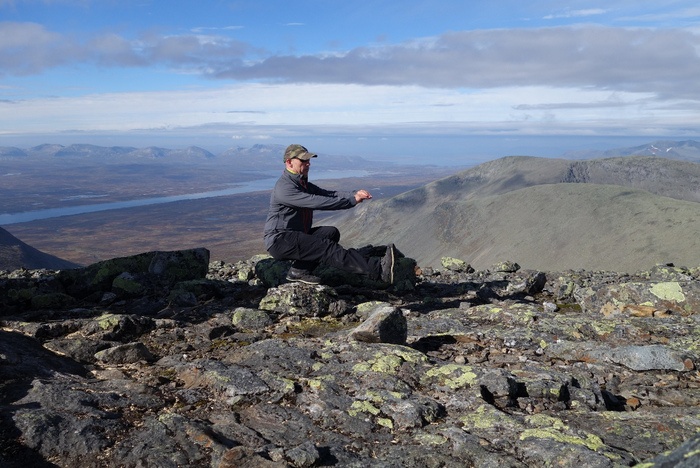
Soon I will be 55 years old, and have decided to step out of my “comfort zone” in my training. Unfortunately an old shoulder injury prevents me from choosing some of the most daring adventures. After some thinking, I decided to choose a Spartan Race or a mountain marathon. Since I love being out in nature, I decided to train for a mountain marathon.
What is a Mountain Marathon?
As the name implies, it is a run of a marathon or longer in a mountainous environment. Around the world there are many of these races. The oldest and most famous one in Sweden is Björkliden Arctic Mountain Marathon (BAMM).
The BAMM competition is special because it is a two day event—and you must carry all the gear and food needed for surviving those two days on the mountain. Teams of two people compete and run nearly 25 miles each day while climbing approximately 4,900 feet in altitude—each day.
To prepare mentally and physically while testing equipment, I will also participate in a tour around Sweden´s highest mountain, Kebnekaise. The Keb Classic Summer contest is Sweden’s slowest marathon, but perhaps the toughest. Running a marathon with a large part of the race in rocky terrain with a climb of more than 4,600 feet requires a lot of preparation.
Requirements for the Challenges
I will be running in two different types of competitions, one with a backpack and one without. Mountain races place the most strain on the ankle, knee and hip. You must be strong from many different angles due to the substrate, and obviously have tremendous endurance. I will also need to train and practice running on flat land and inclines.
Training Examples
A normal week of training from March:
Monday morning: Running 1 hour
Monday evening: Kettlebell training 1 hour
Tuesday: Interval uphill running 1 hour
Wednesday: Kettlebell training 1 hour
Thursday: Downhill running 1 hour
Friday: Kettlebell training 1 hour
Saturday: Rest
Sunday: Long run with backpack 2-3 hours
Kettlebell Training
All strength training is done with kettlebells or bodyweight exercises only. Since I will constantly be in motion, except when reading maps, it is important to choose the right exercises.
Here are my three areas of focus and kettlebell exercise choices:
- Endurance: One arm swing, two arm swing and snatch
- Unilateral Stability: Single leg deadlift, airborne lunge, front squat, single arm row, reverse lunges
- Whole body: Turkish get-up, carry
Example Session:
Warm up 10-20 min
Mobility + TGU
Block 1: 15 minutes
Single leg deadlift 5 reps (posterior strength)
Bottom up press 5 reps
Block 2: 15 minutes (on the minute)
One arm swing (posterior explosivity)
Thoracic bridge
Block 3: 10 minutes
Different types of carries
Depending on how my body feels, I will run various types of workouts with unilateral training. If I feel a bit tired, I extend the warm-up and run a pure endurance workout in 15-20min instead.
To avoid injuries, I almost never go “all out” when doing any of my workouts. The closer you are to your 1 rep max, the higher the risk of injury. A suitable load for the strength training exercises listed above is around 75% -80% of 1RM.
Recovery
For the training to have its maximum effect, you must know the importance of recovery. I can also attest that recovery is even more important as you get older. To tolerate a workout volume of 8-10 hours a week, I have to make sure that my sleep and diet is as good as possible.
Wish me luck with the mountain marathons, I will need it ☺
Michael Kruse
****
Michael Kruse, RKC, PCC instructor believes that age is just a number ☺ he can be contacted by email at kettlebellspecialisten@gmail.com, follow him on Instagram @kettlebellspecialisten